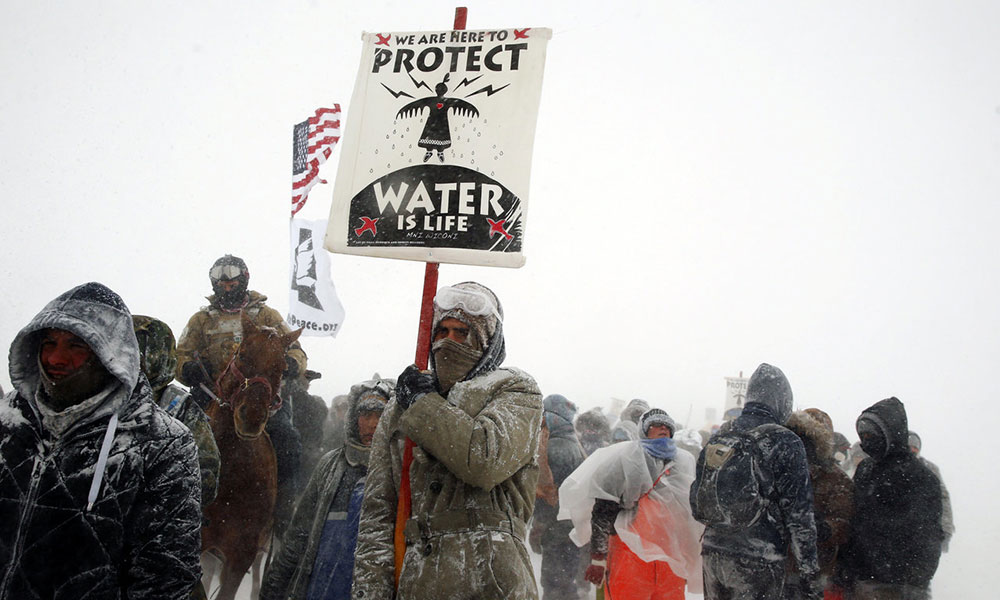
Groups at Center of Standing Rock Protests Respond to Pipeline Decision
The U.S. Army’s decision to block the building of a pipeline near the reservation of the Standing Rock Sioux Tribe adds a new wrinkle to an ongoing fight. But there is a belief on both sides of the issue that the presidential transition may make the decision temporary.
The ongoing protests in North Dakota against a controversial pipeline took a dramatic turn on Sunday, when the U.S. Army announced it would not approve the building of a pipeline near the Standing Rock Sioux Reservation.
The $3.7 billion project, which has been targeted by high-profile protests for many months (and continue despite the chilly December weather), has created a political flash point in the world of environmental advocacy, though industry groups have pushed for the route, arguing it’s the most direct way for the pipeline to move forward.
But the Standing Rock Sioux Tribe has remained steadfast in its opposition to the pipeline and welcomed both the U.S. Army’s decision and President Barack Obama’s thoughtful approach to the issue.
“In a system that has continuously been stacked against us from every angle, it took tremendous courage to take a new approach to our nation-to-nation relationship, and we will be forever grateful,” the group said in a statement.
Here are just a few responses from groups closely following the issue:
Greenpeace: The prominent environmental advocacy group, which directly supports the Standing Rock Sioux Tribe in its battle, spoke of the great effort that has gone into the protests. “Today’s decision shows that when people unite to stand for what’s right, they can alter the course of history,” Greenpeace spokeswoman Lilian Molina stated. “Greenpeace is grateful to the over 300 Indigenous communities, allies, and veterans at Standing Rock for standing up for all of us and showing us the way forward.” The group added that it expected that when the Army Corps of Engineers researched the pipeline, it would be a problematic line “no matter where they attempt to place it.”
International Indigenous Youth Council: A group closely supporting the protesters on the ground has emphasized that, despite the victory, protesters would not be going anywhere—in large part out of concerns that President-elect Donald Trump would reverse the decision. “We know that the next presidency stands to jeopardize our work but we are by no means backing down. We will continue protecting everywhere we go and we will continue to stand for all our relations,” stated Eryn Wise, a spokeswoman for the group, in comments reported by the Camp of the Sacred Stones blog.
MAIN Coalition: In comments to The New York Times, the pro-infrastructure group, which denounced actions against the pipeline as far back as September, suggested the decision was political and would not last beyond the waning days of the Obama administration. “Unfortunately, it’s not surprising that the president would, again, use executive fiat in an attempt to enhance his legacy among the extreme left,” Spokesman Craig Stevens told the newspaper in a statement. “With President-elect Trump set to take office in 47 days, we are hopeful that this is not the final word on the Dakota Access Pipeline.”
Association of Oil Pipe Lines: Taking a stance similar to that of the MAIN Coalition, the association hoped that the Army’s environmental assessment would lead to a favorable decision. “With the federal environmental assessment finding the current route will have the least impact on the environment, we’re looking forward to getting past this administration’s politicization of Dakota Access and future decisions made on the merits of this project,” Spokesman John Stoody told Reuters.
Veterans join activists in a march just outside the Oceti Sakowin camp during a snow fall on Monday. (Lucas Jackson/Reuters0






Comments